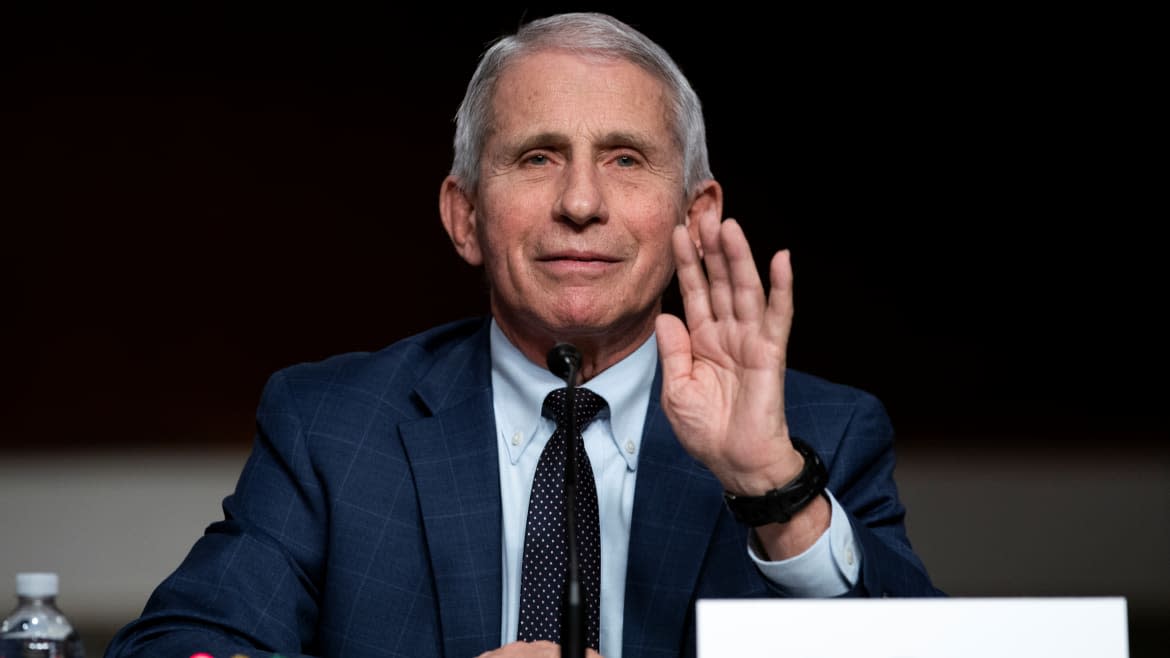Fauci Is Stepping Down for ‘Next Chapter’ of His Career

- Oops!Something went wrong.Please try again later.
- Oops!Something went wrong.Please try again later.
- Oops!Something went wrong.Please try again later.
- Oops!Something went wrong.Please try again later.
Dr. Anthony S. Fauci, the nation’s public health chief who steered Americans through the onset of the COVID-19 pandemic under ex-President Donald Trump, will step down in December, he announced Monday.
Fauci, 81, has run the National Institute of Allergy and Infectious Diseases (NIAID) since 1984. He entered government service in 1968, joining the NIH, NIAID’s parent agency, at the age of 27. When President Joe Biden took office last year, Fauci signed on as his chief medical adviser.
“It has been the honor of a lifetime to have led the NIAID, an extraordinary institution, for so many years and through so many scientific and public health challenges,” Fauci said in an official statement. “I am very proud of our many accomplishments. I have worked with—and learned from—countless talented and dedicated people in my own laboratory, at NIAID, at NIH and beyond. To them I express my abiding respect and gratitude.”
While Fauci acknowledged that he is “moving on from my current positions,” he emphasized he is “not retiring.”
“After more than 50 years of government service, I plan to pursue the next phase of my career while I still have so much energy and passion for my field,” Fauci said. “I want to use what I have learned as NIAID Director to continue to advance science and public health and to inspire and mentor the next generation of scientific leaders as they help prepare the world to face future infectious disease threats.”
In his announcement, Fauci pointed to his nearly four decades as NIAID director, where he served under seven U.S. presidents beginning with Ronald Reagan. During that time, Fauci oversaw the national response to, among other things, HIV/AIDS, West Nile virus, Ebola and Zika, bird flu, assorted influenza outbreaks, and a spate of anthrax attacks. He was awarded the Presidential Medal of Freedom in 2008 under President George W. Bush.
President Biden, in his own statement on Monday, described Fauci as “a dedicated public servant, and a steady hand with wisdom and insight honed over decades at the forefront of some of our most dangerous and challenging public health crises.”
“When it came time to build a team to lead our COVID-19 response—in fact, in one of my first calls as President-elect—I immediately asked Dr. Fauci to extend his service as my Chief Medical Advisor to deal with the COVID-19 crisis our nation faced,” Biden said. “In that role, I’ve been able to call him at any hour of the day for his advice as we’ve tackled this once-in-a-generation pandemic. His commitment to the work is unwavering, and he does it with an unparalleled spirit, energy, and scientific integrity.”
Under the Trump administration, Fauci was regularly demonized by the then-president for speaking truthfully about the havoc COVID would wreak as the White House at first tried to pass it off as a hoax perpetrated by Democrats to harm Trump politically. Fauci also publicly disputed Trump’s insistence that hydroxychloroquine, an anti-malarial drug with little to no effect on COVID, was a “game-changer” in the fight against the virus.
Shortly before losing the 2020 election, a frustrated Trump told rallygoers that he was planning to fire Fauci. In response, then-candidate Biden tweeted, “We need a president who actually listens to experts like Dr. Fauci.” At the time, COVID had claimed more than 230,000 lives in the U.S.
“Instead of throwing me out, they tried to discredit me,” Fauci told The New York Times.
Fauci at times stumbled, such as his early declaration that Americans didn’t need to wear masks. But he earned far higher marks from the public than Trump as the virus emerged, according to polls. The U.S. death toll from COVID has now surpassed 1 million, and an average of more than 95,000 new cases are still being reported weekly.
In an interview with The Washington Post, Fauci called the national COVID response “one of the most important challenges that we have had to face, and I believe my team and I—and let history be the judge of that—have made a major contribution.”
“We didn’t do it alone, but we played a major role in the development of the vaccines that have now saved millions of lives,” he said.
In Monday’s announcement, Fauci said he will spend the coming months putting forth his “full effort, passion and commitment into my current responsibilities,” and prepare for a smooth transition.
“NIH is served by some of the most talented scientists in the world, and I have no doubt that I am leaving this work in very capable hands,” he said. “Thanks to the power of science and investments in research and innovation, the world has been able to fight deadly diseases and help save lives around the globe. I am proud to have been part of this important work and look forward to helping to continue to do so in the future.”
Got a tip? Send it to The Daily Beast here
Get the Daily Beast's biggest scoops and scandals delivered right to your inbox. Sign up now.
Stay informed and gain unlimited access to the Daily Beast's unmatched reporting. Subscribe now.

